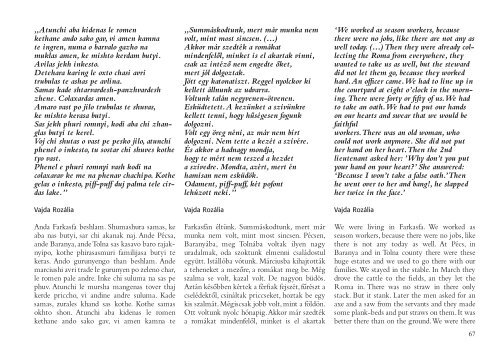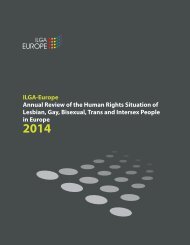Create successful ePaper yourself
Turn your PDF publications into a flip-book with our unique Google optimized e-Paper software.
„Atunchi aba kidenas le romen<br />
kethane ando sako gav, vi amen kamna<br />
te ingren, numa o barvalo gazho na<br />
muklas amen, ke mishto kerdam butyi.<br />
Avilas jekh inkesto.<br />
Detehara karing le oxto chasi avri<br />
trubulas te ashas pe avlina.<br />
Samas kade shtarvardesh-panzhvardesh<br />
zhene. Colaxardas amen.<br />
Amaro vast po jilo trubulas te shuvas,<br />
ke mishto kerasa butyi.<br />
Sas jekh phuri romnyi, kodi aba chi zhanglas<br />
butyi te kerel.<br />
Voj chi shutas o vast pe pesko jilo, atunchi<br />
phenel o inkesto, tu sostar chi shuves kothe<br />
tyo vast.<br />
Phenel e phuri romnyi vash kodi na<br />
colaxarav ke me na phenav chachipo. Kothe<br />
gelas o inkesto, piff-puff duj palma tele cirdas<br />
lake.”<br />
Vajda Rozália<br />
Anda Farkasfa beshlam. Shumashura samas, ke<br />
aba nas butyi, sar chi akanak naj. Ande Pécsa,<br />
ande Baranya, ande Tolna sas kasavo baro ra jak -<br />
nyipo, kothe phirasasmuri familijasa butyi te<br />
keras. Ando gurunyengo than beshlam. Ande<br />
marciushi avri trade le gurunyen po zeleno char,<br />
le romen pale andre. Inke chi suluma na sas pe<br />
phuv. Atunchi le mursha mangenas tover thaj<br />
kerde priccho, vi andine andre suluma. Kade<br />
samas, zurales khand sas kothe. Kothe samas<br />
okhto shon. Atunchi aba kidenas le ro men<br />
kethane ando sako gav, vi amen kamna te<br />
„Summáskodtunk, mert már munka nem<br />
volt, mint most sincsen. (…)<br />
Akkor már szedték a romákat<br />
mindenfelôl, minket is el akartak vinni,<br />
csak az intézô nem engedte ôket,<br />
mert jól dolgoztak.<br />
Jött egy katonatiszt. Reggel nyolckor ki<br />
kellett állnunk az udvarra.<br />
Voltunk talán negyvenen-ötvenen.<br />
Esküdtetett. A kezünket a szívünkre<br />
kellett tenni, hogy hûségesen fogunk<br />
dolgozni.<br />
Volt egy öreg néni, az már nem bírt<br />
dolgozni. Nem tette a kezét a szívére.<br />
És akkor a hadnagy mondja,<br />
hogy te mért nem teszed a kezdet<br />
a szívedre. Mondta, azért, mert én<br />
hamisan nem esküdök.<br />
Odament, piff-puff, két pofont<br />
lehúzott neki.”<br />
Vajda Rozália<br />
Farkasfán éltünk. Summáskodtunk, mert már<br />
mun ka nem volt, mint most sincsen. Pécsen,<br />
Ba ranyába, meg Tolnába voltak ilyen nagy<br />
uradalmak, oda szoktunk elmenni családostul<br />
együtt. Istállóba vótunk. Márciusba kihajtották<br />
a teheneket a mezôre, a romákat meg be. Még<br />
szalma se volt, kazal volt. De nagyon büdös.<br />
Aztán késôbben kértek a férfiak fejszét, fûrészt a<br />
cselédektôl, csináltak priccseket, hoztak be egy<br />
kis szalmát. Mégiscsak jobb volt, mint a földön.<br />
Ott voltunk nyolc hónapig. Akkor már szedték<br />
a romákat mindenfelôl, minket is el akartak<br />
‘We worked as season workers, because<br />
there were no jobs, like there are not any as<br />
well today. (…) Then they were already collecting<br />
the Roma from everywhere, they<br />
wanted to take us as well, but the steward<br />
did not let them go, because they worked<br />
hard. An officer came. We had to line up in<br />
the courtyard at eight o’clock in the morning.<br />
There were forty or fifty of us. We had<br />
to take an oath. We had to put our hands<br />
on our hearts and swear that we would be<br />
faithful<br />
workers. There was an old woman, who<br />
could not work anymore. She did not put<br />
her hand on her heart. Then the 2nd<br />
lieutenant asked her: ’Why don’t you put<br />
your hand on your heart?’ She answered:<br />
‘Because I won’t take a false oath.’ Then<br />
he went over to her and bang!, he slapped<br />
her twice in the face.’<br />
Vajda Rozália<br />
We were living in Farkasfa. We worked as<br />
season workers, because there were no jobs, like<br />
there is not any today as well. At Pécs, in<br />
Baranya and in Tolna county there were these<br />
huge estates and we used to go there with our<br />
families. We stayed in the stable. In March they<br />
drove the cattle to the fields, an they let the<br />
Roma in. There was no straw in there only<br />
stack. But it stank. Later the men asked for an<br />
axe and a saw from the servants and they made<br />
some plank-beds and put straws on them. It was<br />
better there than on the ground. We were there<br />
67



